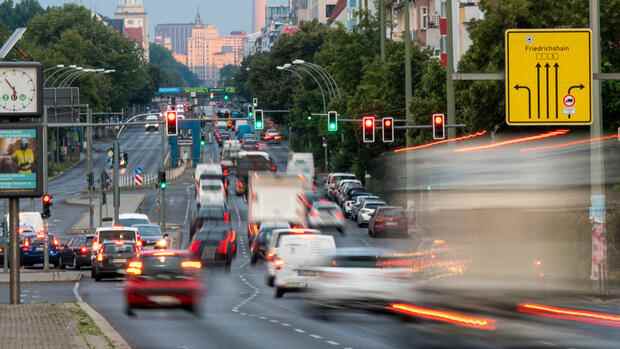So far, the speed in German cities has been limited to either 30 or 50 km/h.
(Photo: dpa)
Berlin The CDU wants to allow Tempo 40 in cities in the future. The application committee of the federal party approved a corresponding application from the state association of Hesse. Accordingly, the approval of the federal party conference in early September is considered certain.
“The CDU Germany is committed to creating a legal basis for the introduction of Tempo 40 in cities as a supplement to the previous options 30 and 50,” says the application, which is available to the Handelsblatt. It is not without reason that the advance comes from Hesse. In 2021, for example, there was a desire for a pilot project in the state capital Wiesbaden to try out the speed limit. There are also considerations in Frankfurt and other Hessian communities.
The application commission of the CDU wants to let the municipalities decide more for themselves in the future. Accordingly, she reworded the Hessian application: “As CDU Germany, we want to support cities and municipalities that have already set 40 km/h restrictions or intend to do so.”
The commission also called on the CDU/CSU parliamentary group to “examine a corresponding “state opening clause” within the framework of the road traffic regulations and the road traffic law “and to campaign for it in the German Bundestag”. The Commission recommends that the 1001 delegates of the federal party congress agree to this.
Top jobs of the day
Find the best jobs now and
be notified by email.
The party conference will take place on September 9th and 10th in Hanover. The CDU wants to give itself new basic values and sharpen its economic policy profile.
When the rules can be adjusted
Praise for the initiative came from the municipal umbrella organizations – combined with further demands. The general manager of the Association of Towns and Municipalities pointed out that the local situation is often very different.
“There are communities with large, wide streets where a speed reduction to 30 or 40 would not be appropriate and would only impede the flow of traffic. Conversely, there are also cities and communities with a very tight building and road situation,” said Gerd Landsberg of the Handelsblatt. The best way is therefore to let the municipalities decide for themselves on speed limits and to increase their scope for action, explained Landsberg.
Municipalities and municipalities want more freedom to set speed limits.
(Photo: dpa)
According to the current legal situation, municipalities may only change the normal speed in order to comply with certain noise limits or to ensure traffic safety. This is increasingly being criticized. A year ago, more than 200 cities and communities nationwide joined the initiative “Cities worth living through reasonable speeds”.
The initiative comes from the German Association of Cities. This promotes the introduction of 30 km/h as the standard speed on the other side of the main roads. Environmental organizations go even further and want to introduce Tempo 30 in general. Tempo 40 or Tempo 50 zones would then be the exception.
City Day President Thomas Jurk had argued similar to Landsberg when presenting the initiative. “Municipalities are best placed to decide what speeds are appropriate on which streets,” he said. The cities wanted to make urban traffic more efficient, more climate-friendly and safer. “But for that we need more decision-making leeway on site.”
>> Read here: Speed limit on motorways: The SPD-Left calls for the FDP to end the blockade
When Federal Transport Minister Volker Wissing (FDP) announced in January that he wanted to give cities more freedom for 30 km/h zones, the City Council welcomed the willingness of politicians. Managing Director Helmut Dedy said that assessing on site whether, when and which measures are necessary and possible for sustainable mobility is a good approach. “We hope that the Ministry of Transport will soon take the necessary steps to achieve this,” he added.
So far, however, nothing further has happened, it was now complaining at the city council. The demands are “still up to date”. In fact, Wissing once again announced the “greater freedom of decision” at the traffic court day in Goslar and explained: “How we can do it together will be a challenge. But I am very open to dialogue here.”
More: 1.8 million tons of CO2 saved – or not? Doubtful figures for the nine-euro ticket
